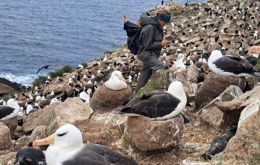MercoPress. South Atlantic News Agency
Tag: High Pathogenicity Avian Influenza (HPAI)
-
Tuesday, July 2nd 2024 - 21:12 UTC
Bird flu pandemic feared to be spreading in slow motion

Scientists have been reported to be fearing a “slow-motion” version of a bird flu pandemic after the virus was detected in 129 dairy herds in the United States, which would make transmission to humans more likely, particularly in the wake of detections among other mammals such as alpacas or domestic cats.
-
Tuesday, May 7th 2024 - 10:26 UTC
Bird Flu in the Falklands: 23/24 season experience and planning for 24/25

On Thursday 2 May the Wildlife Disease Response Group, which includes representatives from Falkland Islands Government, Falklands Conservation, Falkland Islands Tourist Board, Government of South Georgia and South Sandwich Islands, UK Ministry of Defense and other relevant stakeholders, met to discuss the 23/24 summer season specifically about the HPAI situation in the Falklands and the response to it.
-
Wednesday, March 13th 2024 - 06:52 UTC
Avian Flu in South Georgia Gentoo and King penguin colonies

The government of South Georgia and South Sandwich Islands has reported that Highly Pathogenic Avian Influenza (HPAI) has now been confirmed from 23 sites across South Georgia, including a colony of Gentoo and a colony of King penguins.
-
Thursday, January 11th 2024 - 16:59 UTC
Avian Influenza detected in mammals in Sub-Antarctica for the first time; DEFRA funds for FlluTrailMap

The presence of High Pathogenicity Avian Influenza (HPAI) was confirmed on Thursday 11 January for the first time in mammals in sub-Antarctica. The disease was detected in elephant and fur seals on the island of South Georgia by experts from the UK’s world-leading Animal Plant Health Agency (APHA).
